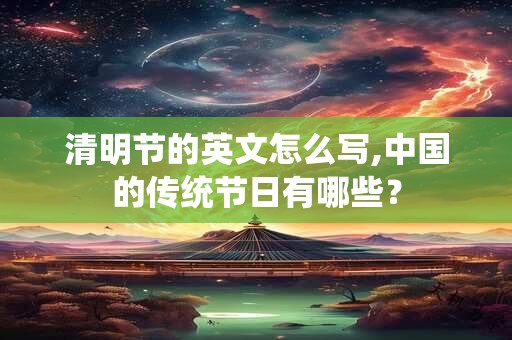Springtime in China is often marked by the solemnity of Qingming Festival, a time when families come together to honor their ancestors. Known as "Tomb Sweeping Day" in English, this traditional event is just one of many that celebrate the rich cultural heritage of our nation. Let's delve into the significance of Qingming Festival and explore some of China's most cherished traditional holidays.
Qingming Festival
Qingming Festival, also known as "Tomb Sweeping Day," falls on April 4th or 5th of the Chinese lunar calendar. It is a time for reverence and remembrance, where families visit the graves of their deceased loved ones to clean tombstones, offer food, and burn incense. The festival also marks the beginning of spring and the revival of nature, with people enjoying outdoor activities like flying kites and taking leisurely strolls.
Chinese New Year
Chinese New Year, or Spring Festival, is the most important traditional holiday in China. Celebrated at the turn of the lunar calendar, it's a time for family reunions, feasts, and fireworks. Red envelopes filled with money are given to children, and houses are decorated with red lanterns and couplets to bring good luck and fortune for the coming year.
Dragon Boat Festival
Held on the fifth day of the fifth lunar month, the Dragon Boat Festival commemorates the death of Qu Yuan, a famous poet and statesman. The festival is marked by dragon boat races, where teams of rowers compete激烈ly to the beat of drums. People also eat sticky rice dumplings, known as zongzi, to symbolize the rice balls thrown into the river to keep fish from eating Qu Yuan's body.
Mid-Autumn Festival
Celebrated on the 15th day of the eighth lunar month, the Mid-Autumn Festival is a time for moon gazing and enjoying mooncakes with family and friends. The festival symbolizes reunion and harmony, with lanterns and colorful displays adorning homes and streets. It's a time to express gratitude for the harvest and to appreciate the beauty of the full moon.
Lantern Festival
The Lantern Festival, or Yuanxiao Festival, marks the end of the Chinese New Year celebrations and falls on the 15th day of the first lunar month. It's a night of illumination, where people release lanterns into the sky and enjoy the company of loved ones.DELICIOUS yuanxiao, or glutinous rice balls, are also eaten on this day, symbolizing unity and completeness.
Double Seventh Festival
Also known as Qixi Festival, this romantic holiday falls on the seventh day of the seventh lunar month. It celebrates the love story of the cowherd Niulang and the weaving girl Zhinu, who are separated by the Milky Way but allowed to meet once a year on this day. Couples exchange gifts, and young girls perform needlework to honor Zhinu's weaving skills.
Moon Festival
The Moon Festival, or Mooncake Festival, coincides with the Mid-Autumn Festival and is celebrated on the 15th day of the eighth lunar month. It's a time for families to gather and enjoy the full moon, which symbolizes reunion and happiness. Mooncakes, filled with various ingredients like lotus seed paste and egg yolk, are a traditional treat during this festival.
Laba Festival
The Laba Festival falls on the 8th day of the 12th lunar month and marks the beginning of the New Year countdown. It's a time for reflection and preparation, with people making Laba porridge from a variety of grains and fruits. The porridge symbolizes good fortune and health for the coming year.
Conclusion
China's traditional festivals are rich in symbolism and history, providing a window into the country's cultural soul. From the solemnity of Qingming Festival to the joyous celebrations of the Spring Festival, these events bring families together, fostering a sense of community and continuity. By understanding and participating in these festivals, we not only honor our ancestors but also carry forward the traditions that have shaped our nation's identity.

